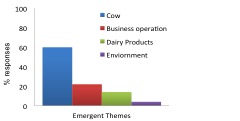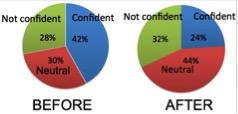Click here for article in pdf format.
The European community has placed some effort into understanding the public’s views of animal agriculture, including the dairy industry. However, little is known about the expectations of the dairy industry by North American citizens.
To provide some insight on this issue we conducted two studies, one where we asked participants how they would describe the ideal dairy farm and the second where participants were surveyed before and after touring a dairy farm.
In the first study we conducted an online survey with 468 American citizens. In this survey we asked a single open-ended question: What do you consider to be an ideal dairy farm and why are these characteristics important to you? The responses were coded into themes (Fig 1). Participants generally cited more than one characteristic with multiple reasons for each.
The most commented issues related to the “cow” herself, reflecting concerns about cow treatment. For example, many participants commented on how important it was that the farmer and workers treated cows humanely. For example, people commented on the value of treating the animals with “respect,” “fairly,” “kindly,” “with love,” and with “dignity”.
Participants also mentioned aspects related to the business operation, suggesting that the ideal farm should also be profitable, productive, and efficient. Some participants also suggested that the farm should be small, organic, operated by family farmers, and committed to their community (e.g., offering tours or selling their products locally). Participants also said that the farmers should be efficient, educated, loving, and competent.

Fig 1. Emergent themes that arose from the responses of 468 Americans to an on line survey where they were asked to describe an ideal dairy farm.
Some participants also commented on the importance of the quality of production, stating that the ideal dairy farm must produce high-quality milk products and that these products be clean and safe to consume. However, they rejected the use of hormones, antibiotics or other chemicals for the purposes of increasing production but did state that animals should be treated when sick. The respondents also suggested that the cow’s quality of life influences the quality of the milk she produces, which in turn influences human health.
In a second study, we interviewed 50 Canadian participants before and after a self-guided tour of our University dairy farm (the UBC Dairy Education and Research Centre in Agassiz, BC). Our aim was to assess how participants perceived dairy farms and whether their perceptions changed after visiting a working farm.
Participants were asked about any concerns that they had before the tour. The four most frequently raised issues prior to the tour were quality of feed provided to the animals, whether cows had access to pasture, if they had sufficient space and whether they were treated with care.
As we had expected, some perceptions improved after participants visited the farm. For example, people commented positively on the quality of care provided to the cows and calves on this farm. However, participants also discovered new issues or had their existing concerns reinforced when they visited the farm. For example, after the visit participants commented on cow-calf separation, lack of pasture access, space, and poor hygiene.
A common belief is that ‘educating the public’ will help people to better understand farming practices, and thus help to confront any objections built upon public ignorance. Thus a second aim of this study was to also test participant knowledge of dairy farming practices before and after the farm visit, to determine if visiting the farm increased knowledge and increased acceptance. The quiz questions used to test the knowledge level of the participants related to basic dairy husbandry practices. On average, participants answered 3 of the 5 questions correctly before the tour. After the tour performance increased, with people answering 4 of 5 questions correctly, but the people who did best on the test were no more positive in their perception of the farm.
As a final question, participants were asked how confident they were that dairy cows have a good life. Before visiting the dairy farm a little less than half of the participants said that they were confident that dairy cows had a good life (Fig 2). After visiting the farm less that 25% responded that they were confident, with the remainder either unsure or were not confident in the quality of life of dairy cows.

Fig 2. Responses from 50 individuals who were asked how confident they were that dairy cattle have a good life before and after touring a dairy farm
Both studies illustrate the importance that members of the public put on an animal’s freedom to move and their ability to fulfill natural and highly motivated behaviors like grazing on pasture. Thus participants, who became acquainted with the practices of early cow-calf separation and lack of access to pasture, tended to lose confidence in dairy farming. Both studies also illustrated the importance that respondents placed on the actions and attitudes of the people responsible for the care of cattle on dairy farms.
In summary, the values of the public (for example, concerning the importance of care and pasture access) appeared to play a key role in determining their expectations for the modern dairy farm. Public education may be important in allowing for informed debate on contentious topics, but the results of these studies suggest that education alone will not make the public more supportive of dairy farming. Exposure to livestock farming may resolve certain concerns, but other concerns will likely persist, especially when practices conflict with deeply held values around animal care. Assurances that animals are well treated, and are able to perform important natural behaviors will improve the social sustainability of the dairy industry.
UBC Dairy Education & Research Centre
Faculty of Land and Food Systems Nelson Dinn, Manager Email dinn@shawbiz.ca
6947 No. 7 Highway, P.O. Box 202, Agassiz, BC V0M 1A0 Telephone 604-796-8410 Fax 604-796-8413
UBC Animal Welfare Program
